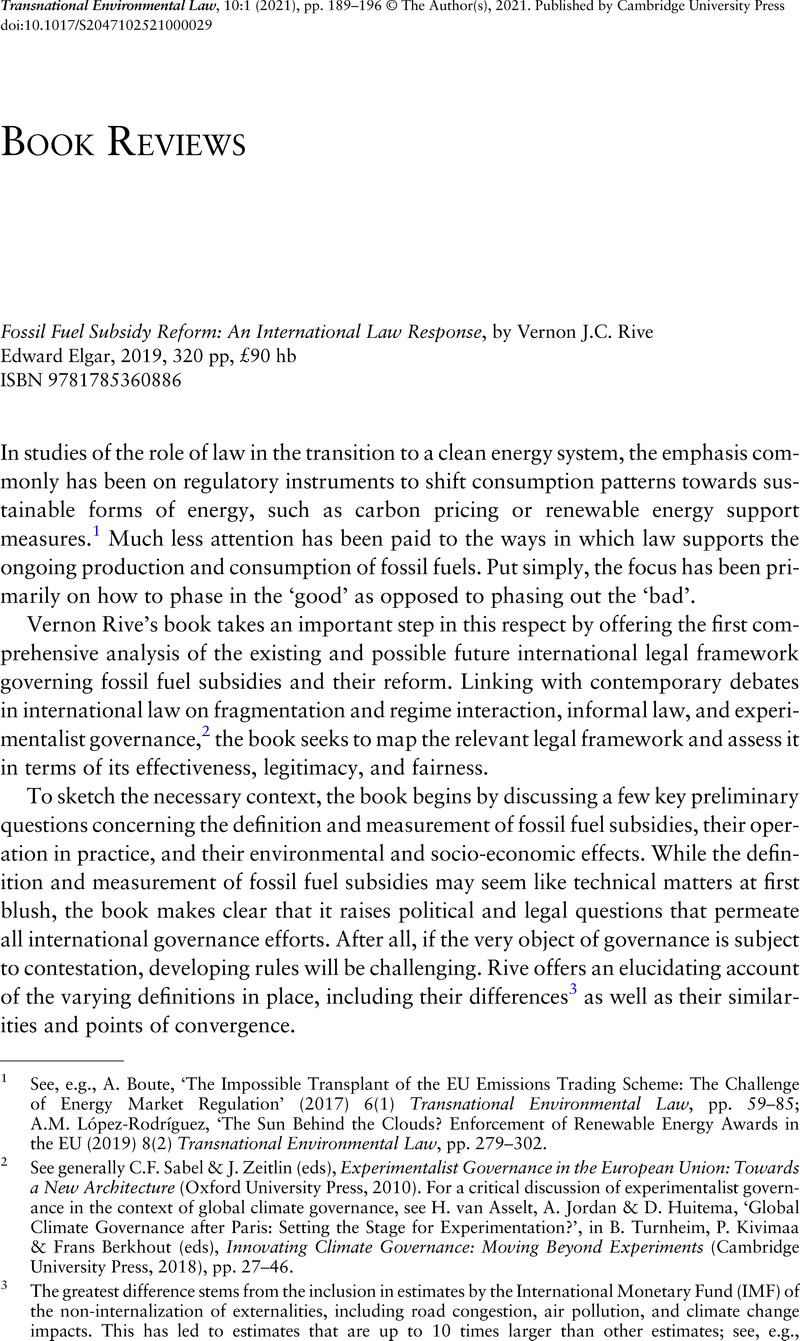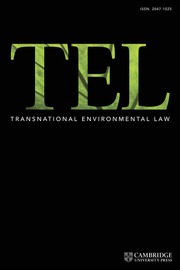No CrossRef data available.
Article contents
Fossil Fuel Subsidy Reform: An International Law Response, by Vernon J.C. Rive Edward Elgar, 2019, 320 pp, £90 hb ISBN 9781785360886
Published online by Cambridge University Press: 04 March 2021
Abstract

- Type
- Book Reviews
- Information
- Copyright
- Copyright © The Author(s), 2021. Published by Cambridge University Press
References
1 See, e.g., Boute, A., ‘The Impossible Transplant of the EU Emissions Trading Scheme: The Challenge of Energy Market Regulation’ (2017) 6(1) Transnational Environmental Law, pp. 59–85CrossRefGoogle Scholar; López-Rodríguez, A.M., ‘The Sun Behind the Clouds? Enforcement of Renewable Energy Awards in the EU (2019) 8(2) Transnational Environmental Law, pp. 279–302CrossRefGoogle Scholar.
2 See generally Sabel, C.F. & Zeitlin, J. (eds), Experimentalist Governance in the European Union: Towards a New Architecture (Oxford University Press, 2010)Google Scholar. For a critical discussion of experimentalist governance in the context of global climate governance, see van Asselt, H., Jordan, A. & Huitema, D., ‘Global Climate Governance after Paris: Setting the Stage for Experimentation?’, in Turnheim, B., Kivimaa, P. & Berkhout, Frans (eds), Innovating Climate Governance: Moving Beyond Experiments (Cambridge University Press, 2018), pp. 27–46CrossRefGoogle Scholar.
3 The greatest difference stems from the inclusion in estimates by the International Monetary Fund (IMF) of the non-internalization of externalities, including road congestion, air pollution, and climate change impacts. This has led to estimates that are up to 10 times larger than other estimates; see, e.g., D. Coady et al., Global Fossil Fuel Subsidies Remain Large: An Update Based on Country-Level Estimates (IMF, 2019), available at: https://www.imf.org/en/Publications/WP/Issues/2019/05/02/Global-Fossil-Fuel-Subsidies-Remain-Large-An-Update-Based-on-Country-Level-Estimates-46509 (estimating global subsidies at USD 5.2 trillion in 2017). Such estimates should not be considered financial transfers for fossil fuel production and consumption, but rather estimates of how much fossil fuels are underpriced.
4 Although Rive does not discuss this in detail, a recent study sheds further light on this: T. Moerenhout & T. Irschlinger, ‘Exploring the Trade Impacts of Fossil Fuel Subsidies’, International Institute for Sustainable Development, Mar. 2020, available at: https://www.iisd.org/sites/default/files/publications/trade-impacts-fossil-fuel-subsidies.pdf.
5 See also Erickson, P. et al. , ‘Why Fossil Fuel Producer Subsidies Matter’ (2020) 578(7793) Nature, pp. E1–E4CrossRefGoogle ScholarPubMed.
6 New York, NY (US), 9 May 1992, in force 21 Mar. 1994, available at: https://unfccc.int/resource/docs/convkp/conveng.pdf.
7 United Nations (UN) General Assembly, ‘Transforming Our World: The 2030 Agenda for Sustainable Development’ (21 Oct. 2015), UN Doc. A/RES/70/1, available at: https://sustainabledevelopment.un.org/post2015/transformingourworld.
8 ‘G20 Leaders Statement: The Pittsburgh Summit’, 24–25 Sept. 2009, para. 24, available at: http://www.pittsburghsummit.gov/mediacenter/129639.htm.
9 See, e.g., C. Verkuijl & H. van Asselt, ‘Fossil Fuel Subsidy Reform Interactions between International Cooperative Institutions: The More, the Merrier?’, in F. Zelli et al. (eds), Governing the Climate-Energy Nexus: Institutional Complexity and Its Challenges to Effectiveness and Legitimacy (Cambridge University Press, 2020), pp. 131–55, at 136.
10 Marrakesh (Morocco), 15 Apr. 1994, in force 1 Jan. 1995, available at: https://www.wto.org/english/docs_e/legal_e/24-scm_01_e.htm.
11 See, e.g., Asmelash, H.B., ‘Energy Subsidies and WTO Dispute Settlement: Why Only Renewable Energy Subsidies Are Challenged’ (2015) 18(2) Journal of International Economic Law, pp. 261–85CrossRefGoogle Scholar; Verkuijl, C. et al. , ‘Tackling Fossil Fuel Subsidies through International Trade Agreements: Taking Stock, Looking Forward’ (2019) 58(2) Virginia Journal of International Law, pp. 309–68Google Scholar; H. van Asselt & T. Moerenhout, ‘Fit for Purpose? Toward Trade Rules that Support Fossil Fuel Subsidy Reform and the Clean Energy Transition’, Nordic Council of Ministers, TemaNord 2020:539, Nov. 2020.
12 See New Zealand Government, Foreign Affairs & Trade, ‘Agreement on Climate Change, Trade and Sustainability (ACCTS) Negotiations’, available at: https://www.mfat.govt.nz/en/trade/free-trade-agreements/climate/agreement-on-climate-change-trade-and-sustainability-accts-negotiations.
13 See, e.g., Skovgaard, J. & van Asselt, H. (eds), The Politics of Fossil Fuel Subsidies and Their Reform (Cambridge University Press, 2018)CrossRefGoogle Scholar.
14 Going beyond collecting publicly available data, Rive has also employed freedom of information requests to gather information, leading to interesting insights into the domestic politics of fossil fuel subsidy reform in his home country, New Zealand. This means of data gathering can be of particular value where levels of transparency are generally low, as is the case for fossil fuel subsidies.


